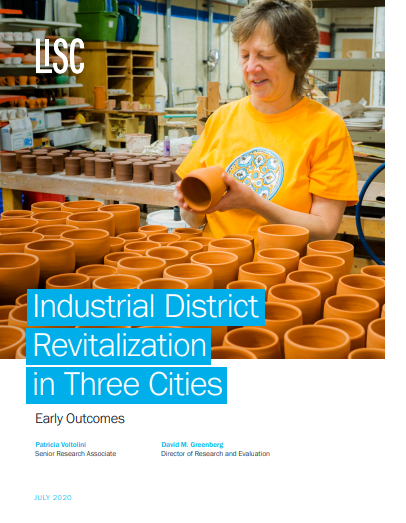The latest white paper from our Research & Evaluation team shows how LISC's ongoing work to support collaborative revitalization of industrial districts, in ways that promote equitable benefits for businesses and residents, helps bolster surrounding communities, even in the age of Covid-19.
More than 40 million: that’s the number of unemployment claims filed since the coronavirus began spreading across the United States. In the face of that overwhelming statistic, it is worth remembering the work that occurs, neighborhood by neighborhood, to create good jobs that are accessible to residents of color.
For many years, LISC has worked with a range of partners to revitalize older industrial districts in inclusive and equitable ways, so that the benefits of revitalization spill over to surrounding communities of color. The fruits of these efforts can be seen in Duluth, Jacksonville and Indianapolis, where LISC intentionally engaged partners to make catalytic investments that showed the viability of industrial districts, seeded homegrown revitalization efforts of local business and community groups while building their capacity for advancing commercial and industrial revitalization. In the process, LISC helped create the infrastructure, or ecosystem, for collaboration and growth. Thanks to this collective work, these districts have experienced a revival with new or expanding businesses, new jobs and amenities for residents, and a renewed sense of local pride and enthusiasm.
While the COVID pandemic may have halted local business growth, the infrastructure for collaboration and cooperation in these districts remains strong, and is helping mitigate economic and job losses while serving urgent community needs. In Indianapolis, a small batch sewing company called StitchWorks was able to quickly adjust their production to make personal protective equipment (PPE) for Eskenazi Health. Similarly, Frost River Trading Company in Duluth converted their entire canvas bag retail area into an additional production floor to fabricate PPE for local hospitals. And OMC Smokehouse, a beloved community restaurant in Duluth, created a recipe book that is selling online to raise funds for the Lifting Lincoln Park fund to support local businesses and neighborhood residents affected by the pandemic.
Such effective collaborations are the result of deep, long-term ties of trust and shared commitment to communities. The work to support this infrastructure is more important than ever, as local businesses and community-based organizations are on the front lines of this crisis and are best positioned to allocate the resources needed to sustain these districts in difficult times and to assist recovery efforts ahead.
LISC Research and Evaluation’s new white paper, “Industrial District Revitalization in Three Cities,” examines how that ecosystem for collaboration was established in Duluth, Jacksonville, and Indianapolis in ways that support equitable economic outcomes. The paper provides policy and practice recommendations to support that model and that can be used to guide equitable recovery and resilience elsewhere.

This white paper and related case studies show how LISC's ongoing work to support collaborative revitalization of industrial districts, in ways that promote equitable benefits for businesses and residents, helps bolster surrounding communities, even in the age of Covid-19.
 About the Author
About the Author
Patricia Voltolini, Senior Research Associate
Patricia is a mixed-methods researcher and supports LISC’s research and evaluation needs. Her current work involves evaluating LISC’s impact in communities across the country, developing innovative research that explores and highlights topics of emerging importance in the field, and assisting data and research needs of local offices and national programs. She holds a Ph.D. in Planning and Public Policy from Rutgers University, and is a Visiting Assistant Professor in the Graduate Center for Planning and Environment at the Pratt Institute.
